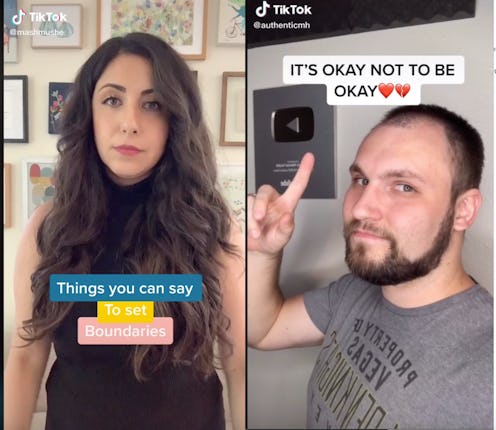Life
What To Know About All The Mental Health Advice You're Seeing On TikTok
In between a TikTok featuring a stress-lowering yoga flow and video explaining how to incorporate self-love into mealtime, you might find a video about safe alternatives to self-harm. A quick cruise through the hashtag #MentalHealthAwareness unearths a wealth of mental health professionals on TikTok offering advice, tips, and techniques to viewers' emotional well-being. This kind of content, experts say, can help to support people who are coping with mental health issues, even if they can't seek individualized help.
Dr. Courtney Tracy, L.C.S.W., Psy.D, has about 250,000 followers on TikTok, where she posts as @The.Truth.Doctor. According to Dr. Tracy, who makes videos about cognitive and dialectical behavioral therapy techniques, it only took three months to build that following. She gets tons of messages from followers, many thanking her for providing tips and sharing details about their personal lives with her. They also complain about the systems and people in their lives that make it hard for them to get help or open up. It's for this latter reason that mental health experts like herself are finding so much success on the app.
"TikTok offers an unprecedented opportunity to help de-stigmatize therapy and mental health issues for teens and people of all ages," Dr. Tracy tells Bustle. "The authenticity that people show on TikTok is dramatically supportive of the normalization of many difficult and varying mental health concepts," she says.
Licensed counselor Lindsay Fleming, L.P.C., who has nearly 150,000 followers on the app, says that most of her messages come from teenagers who are struggling with their mental health and feel uncomfortable seeking help elsewhere. "Many describe feeling heard for the first time, while others say my general tips are helping them take the first steps in bettering their condition," Fleming says.
Therapist Micheline Maalouf, L.M.H.C., has over 160,000 followers on TikTok. "Some people said that my videos were the reason they decided to seek help from a therapist," she tells Bustle. For others, therapy isn't an option. In that case, Maalouf sees TikTok as a valuable alternative. "I think people are grateful to be able to get mental health education for free."
Though this kind of content has become more popular on TikTok recently, it's not exactly new. On Instagram, therapy meme culture has given mental health professionals influencer-level platforms for years. And as professionals are quick to point out, watching mental health videos on TikTok — or any social platform — is not the same as going to therapy. Still, TikTok therapists believe it's better than nothing. "A huge part of therapy is to help people develop self-awareness and give them the information they need to self-reflect," Maalouf says, and mental health content can offer that, even when it's engaged in passively. "We provide tools, tips, and tricks that we would provide our clients in session. I believe it can be a compromise for people to feel heard and validated and get they information they need," she says.
It's not just licensed therapists providing this content, either. Charles Marshall is a mental health advocate and content creator with a quarter of a million followers on TikTok and millions more across Instagram and YouTube. Marshall is not a licensed therapist, but he posts anxiety reduction hacks, self-harm alternatives, and messages of support online. "I don't diagnose people, I offer advice, support and show others they are not alone," he says. Marshall draws on his personal experience living with panic disorder, generalized anxiety disorder, and depression to share videos that aim to normalize talking about mental health and provide self-soothing techniques. "I get hundreds of messages a day from people saying how much my videos have helped them, and many of them now are going to therapy," he says.
Maalouf says that people don't necessarily need to be professionals to make content that's helpful. "There are some great people out there that have experience and share their stories and help others through that perspective and that can be powerful." Dr. Tracy agrees, but adds that it depends on the creator and their specific content. "Mental health content should be based in scientific inquiry and expertise, and it should have disclaimers whenever needed to reference the limited support the content can really provide," she says. Fleming advocates turning to "licensed providers who have background training, experience, and ongoing education on evidence-based treatments" when it comes to seeking mental health support.
TikTok's Community Guidelines do not permit medical misinformation, and the platform says it will remove any content that can cause harm to an individual's health. In a statement to Bustle, Gregory Justice, head of content programming at TikTok U.S., said that "it's inspiring to see mental health professionals embracing TikTok, to not only spread positivity and share practical advice, but to also engage the community in a dialogue around emotional wellbeing."
While the app monitors mental health content, it's important to look out for yourself before taking any advice to heart. You can check creator profiles for common accreditations, like Doctor of Psychology (Psy.D), Doctor of Philosophy (Ph.D), Licensed or Clinical Social Worker (L.C.S.W.). Report videos that are triggering or that contain misinformation. And if you want to speak with someone, teletherapy companies like Talkspace or Pride Counseling, or services like the Crisis Text Line, are there for you.
Sources:
Dr. Courtney Tracy, L.C.S.W., Psy.D.
Micheline Maalouf, L.M.H.C.
Lindsay Fleming, L.P.C.
Charles Marshall, founder of Authentic Mental Health, an online community.
